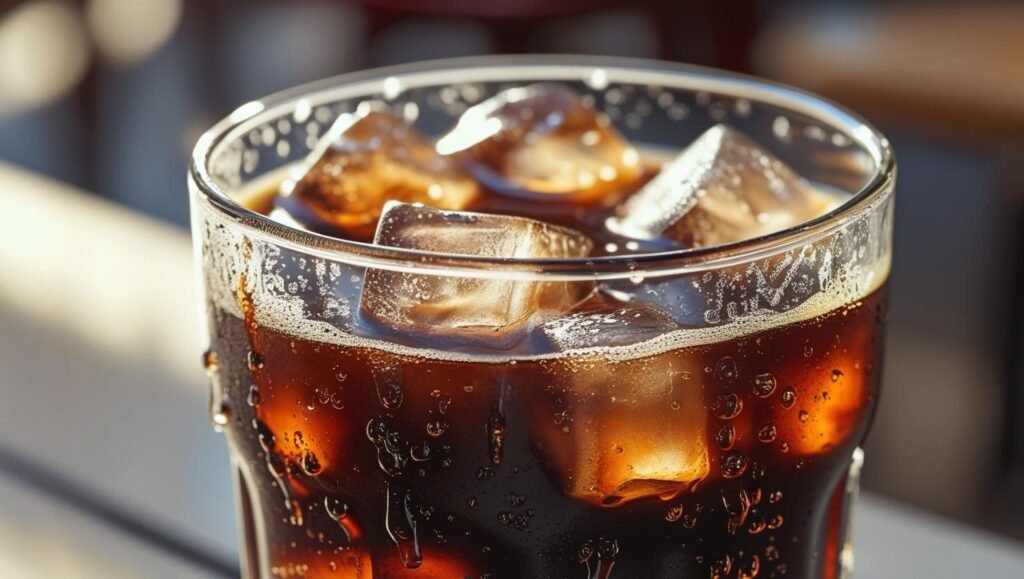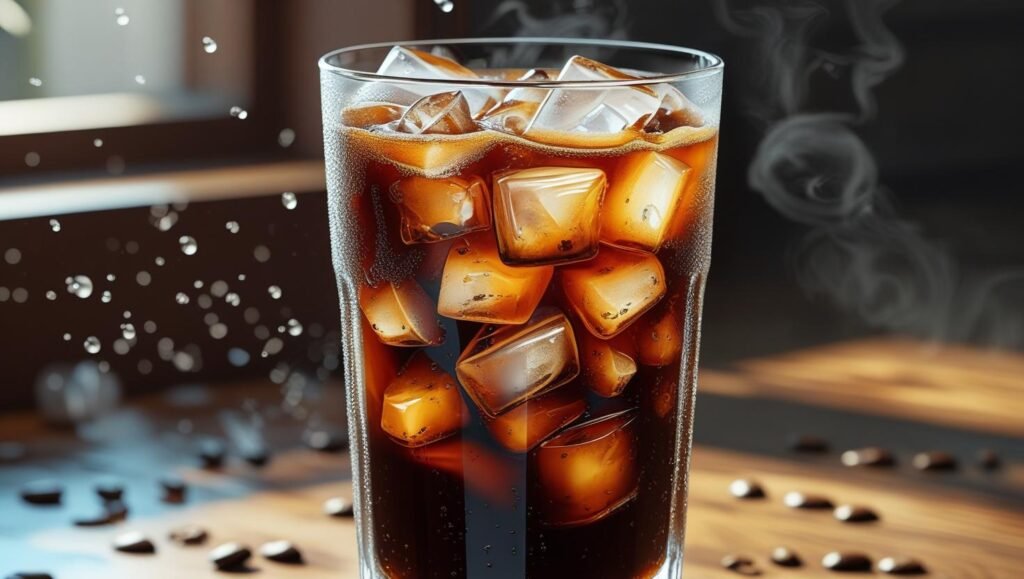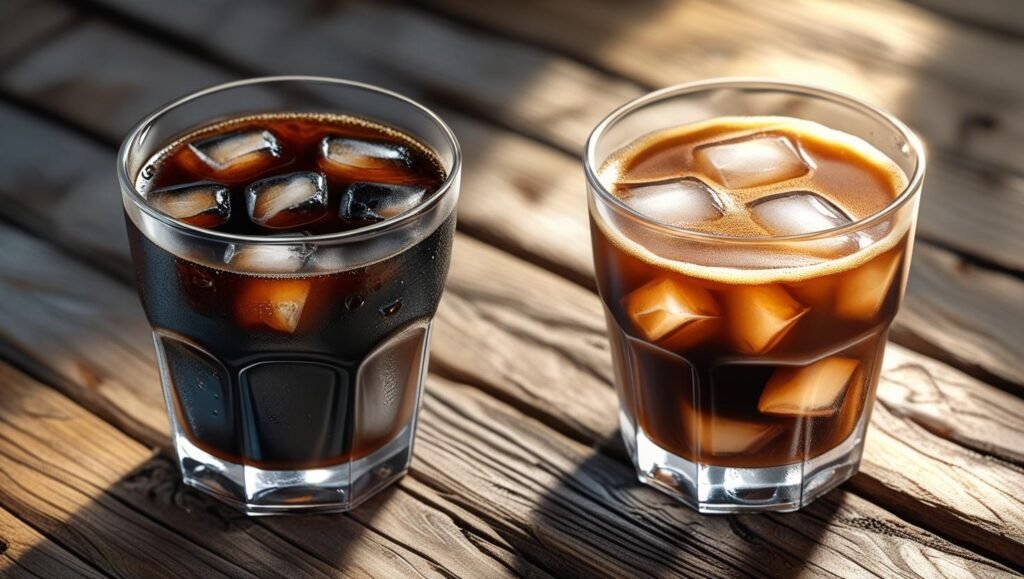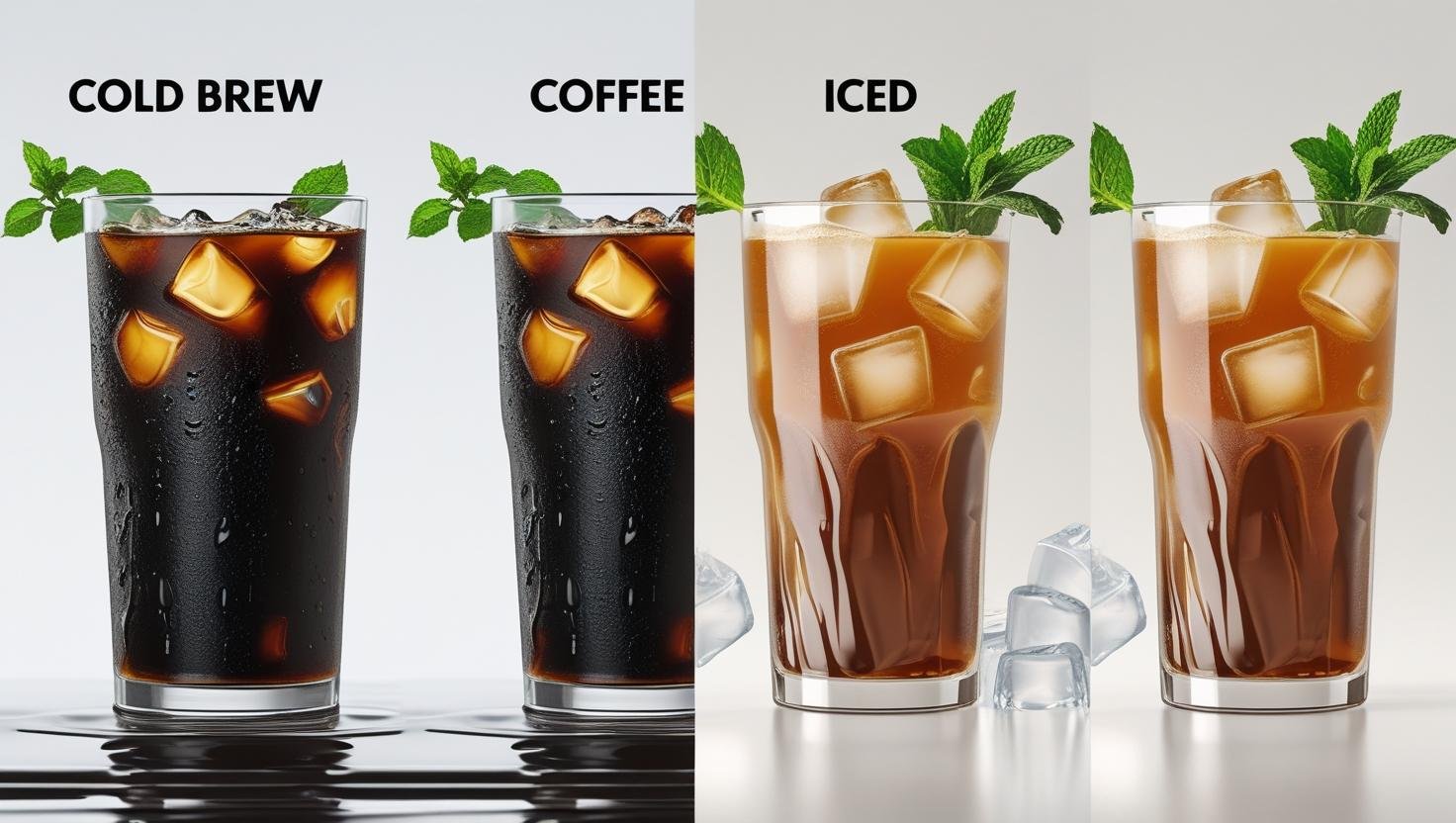Contents
Introduction
Coffee lovers often face a refreshing dilemma—cold brew or iced coffee? While both are served cold, they’re not the same. The difference between cold brew and iced coffeehttps://www.foodandwine.com/cold-brew-vs-iced-coffee-7567073 lies in their brewing method, flavor profile, caffeine content, and overall experience.
In this blog, we’ll explore the cold brew vs iced coffee debate in detail so that the next time you need a chilled caffeine fix, you’ll know exactly what to order or brew at home.
What is Cold Brew?

Cold brew coffee is made by steeping coarsely ground coffee beans in cold water for an extended period, typically 12 to 24 hours. Unlike traditional brewing, it uses no heat. This slow extraction process creates a smooth, rich, and slightly sweet cup of coffee.
How Cold Brew is Made
- Use coarsely ground coffee beans.
- Mix with cold filtered water in a 1:4 to 1:8 ratio.
- Let it steep in the fridge or at room temperature for 12–24 hours.
- Strain using a fine mesh or coffee filter.
- Serve cold, often over ice or diluted with milk or water.
What is Iced Coffee?

Iced coffee is regular hot brewed coffee that is cooled down and poured over ice. It’s much faster to make than cold brew and retains the bright, acidic notes of traditional hot coffee.
☕ How Iced Coffee is Made
- Brew hot coffee using your preferred method (drip, pour-over, or French press).
- Let it cool or brew it directly over ice (Japanese-style).
- Pour into a glass filled with ice.
- Add milk, cream, or sweetener if desired.
Cold Brew vs. Iced Coffee: Key Differences
Let’s break down the difference between cold brew and iced coffee point-by-point.
1. Brewing Time & Method
| Feature | Cold Brew | Iced Coffee |
| Brewing Time | 12–24 hours | 5–10 minutes |
| Temperature | Cold/room temp water | Hot water |
| Process | Steeping | Traditional hot brew |
Cold brew takes much longer but requires less active time. Iced coffee is faster and convenient when you’re short on time.
2. Flavour Profile
- Cold Brew: Smooth, mellow, low acidity, slightly sweet, full-bodied.
- Iced Coffee: Bright, acidic, bold, and sometimes bitter.
The slow cold extraction of cold brew coffee brings out subtle chocolate or nutty notes, while hot brewed iced coffee retains sharper acidic tones.
3. Caffeine Content
Generally, cold brew contains more caffeine than iced coffee due to the high coffee-to-water ratio and longer brewing time. However, this can vary depending on how each is diluted.
| Beverage | Average Caffeine (per 16 oz) |
| Cold Brew | 200–300 mg |
| Iced Coffee | 150–200 mg |
If you need a strong jolt, cold brew coffee might be your pick.
4. Acidity
Cold brew is naturally lower in acidity compared to iced coffee, making it gentler on the stomach and ideal for people with acid reflux or sensitivity.
5. Shelf Life
- Cold Brew: Can be stored in the refrigerator for up to 7–10 days.
- Iced Coffee: Best consumed immediately after brewing. It can become stale or bitter after a few hours.
6. Versatility
Cold brew is often used as a coffee concentrate and can be customized:
- Serve it black or with milk/cream.
- Use it in coffee cocktails.
- Mix it with flavored syrups for a cold brew latte.
Iced coffee is best enjoyed fresh and doesn’t store well.
Pros and Cons
Cold Brew
Pros:
- Smooth, rich taste
- Low acidity
- Higher caffeine
- Longer shelf life
Cons:
- Long brewing time
- Requires planning
- Needs coarse grind and filtering setup
Iced Coffee
Pros:
- Quick and easy to make
- Classic coffee flavour
- Less equipment needed
Cons:
- More acidic and bitter
- Doesn’t store well
- Can be watered down by ice
Cold Brew vs Iced Coffee: Which One Should You Choose?

It all depends on your preference:
- Choose cold brew if you like a smooth, mellow taste, want less acidity, and don’t mind the wait.
- Choose iced coffee if you need a quick, bold-flavored cup and don’t mind a little acidity.
Pro Tips for Making the Best Cold Coffee
- Always use freshly ground beans for best flavor.
- Use filtered water for a clean taste.
- For cold brew, try single-origin beans with chocolatey or nutty notes.
- For iced coffee, try medium to light roast for brighter flavors.
- To avoid dilution, use coffee ice cubes instead of regular ice.
FAQs: Cold Brew vs Iced Coffee
What is stronger, cold brew or iced coffee?
Cold brew is usually stronger in caffeine because it is more concentrated. However, this can vary depending on how both drinks are diluted.
1. Is cold brew less acidic than iced coffee?
Yes, cold brew is naturally lower in acidity, making it a smoother and gentler drink on your stomach.
2. Can I make cold brew at home without fancy equipment?
Absolutely! All you need is coarse coffee grounds, cold water, a jar, and a fine mesh strainer or cheesecloth.
3. Which tastes better: cold brew or iced coffee?
Taste is subjective. Cold brew is smoother and sweet; iced coffee is brighter and more acidic. Try both and decide what suits your palate.
4. How long does cold brew last in the fridge?
Homemade cold brew can last up to 7–10 days in the fridge. Store it in an airtight container.
Conclusion
Whether you’re team cold brew or team iced coffee, both are excellent ways to enjoy a refreshing, chilled cup of coffee. By understanding the key differences between the two, you can pick the perfect option based on your mood, taste preferences, and time.
Next time you crave a cold cup of joe, ask yourself: do you want it fast and bold (iced coffee) or slow and smooth (cold brew)? Either way, you win!

